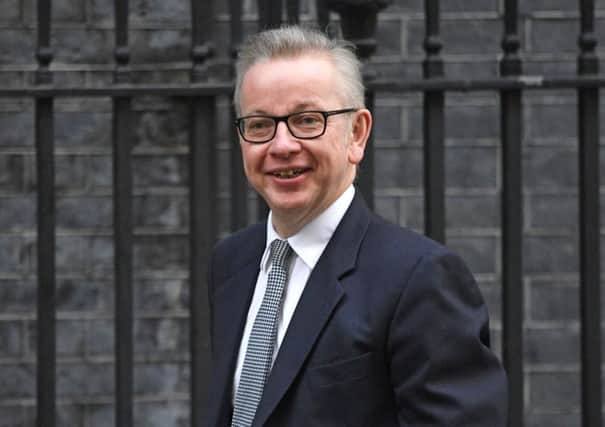Defra vows to spend millions to compensate farmers in event of no deal


It comes after a stark warning that many of Scotland’s 18,000 crofters and farmers could go to the wall if costly tariffs are imposed on meat exports to the European Union.
The leading Brexiteer Cabinet minister will also have crunch talks with Holyrood’s Agriculture Secretary Fergus Ewing, who has called for no deal to be taken off the table.
Advertisement
Hide AdAdvertisement
Hide AdMr Ewing said yesterday: “There are immediate threats facing our farmers in the event of a no deal posed by both the loss of labour and also tariffs imposed, particularly on beef and lamb, of 40 per cent to 50 per cent – basically a tax of 40 per cent to 50 per cent on our export market.
“The immediate fear of a no deal – and Michael Gove agrees with this – would likely result in many of these thousands of farmers going out of business.”
Mr Ewing had been lobbying for the UK government to set aside a compensation package for the industry in the event of a no-deal Brexit. Mr Gove has now accepted that principle and details will be provided when the pair meet in Glasgow today.
But Mr Ewing added: “It’s better to avert a disaster than deal with the consequences of it after it arises. My call has been that a no-deal Brexit is not just a mistake, it is recklessness.”
He added: “I understand that the level of compensation throughout the UK could be of the order of around £300 million a year. This is entirely avoidable if a no-deal Brexit is taken off the table.”
The loss of freedom of movement after Brexit could also mean serious labour shortages for farmers, particularly of EU workers.
Mr Gove said on a visit to the North-east of Scotland last week that he remained confident a deal will be reached with the EU on post-Brexit trade arrangements.
But he added: “Our contingency plans are well advanced in the event of a no-deal.
Advertisement
Hide AdAdvertisement
Hide Ad“All livestock sectors will be included in the proposed compensation scheme, including dairy, but the sheepmeat sector is the most vulnerable and will need to be protected.”
There are also concerns about the subsidy levels paid to Scots farmers in the event of no deal
A deal has been done to secure farmers’ payments until 2022, but Mr Ewing voiced fears that the UK government may end direct payments after this.
He said: “We’re very worried that the UK plan is to scrap direct payments to farmers as soon as they possibly can.
“We’re opposed to that, but the assurances that we’ve received from the UK government have not been comprehensive.”
He insisted that the Scottish Government has plans in place to fund the rural sector to 2024, despite claims to the contrary from Mr Gove.
Mr Ewing added: “I have serious worries for the future of our farmers in Scotland, many of whom are farming with low margins in difficult land and already facing higher feed costs, tremendously bad weather last year and reduced beef prices.”
The Scottish Government has said it wants to see a “continuity” of the financial payments to Scotland’s farmers and crofters based on the current EU regime when power is devolved to the UK, so that there is more certainty for the sector.
Advertisement
Hide AdAdvertisement
Hide AdA Defra spokeswoman said: “We have already confirmed we will maintain the same cash total funding for the sector until 2022 – this includes all EU and Exchequer funding provided for farm support under both Pillar 1 and Pillar 2 of the current CAP [Common Agricultural Policy].
“This is a clear demonstration of our ongoing support for the farming sector as we leave the EU, providing them with further security on future funding than our European neighbours.”
Ministers are to step up engagement with industry on the steps required in the event of no deal.